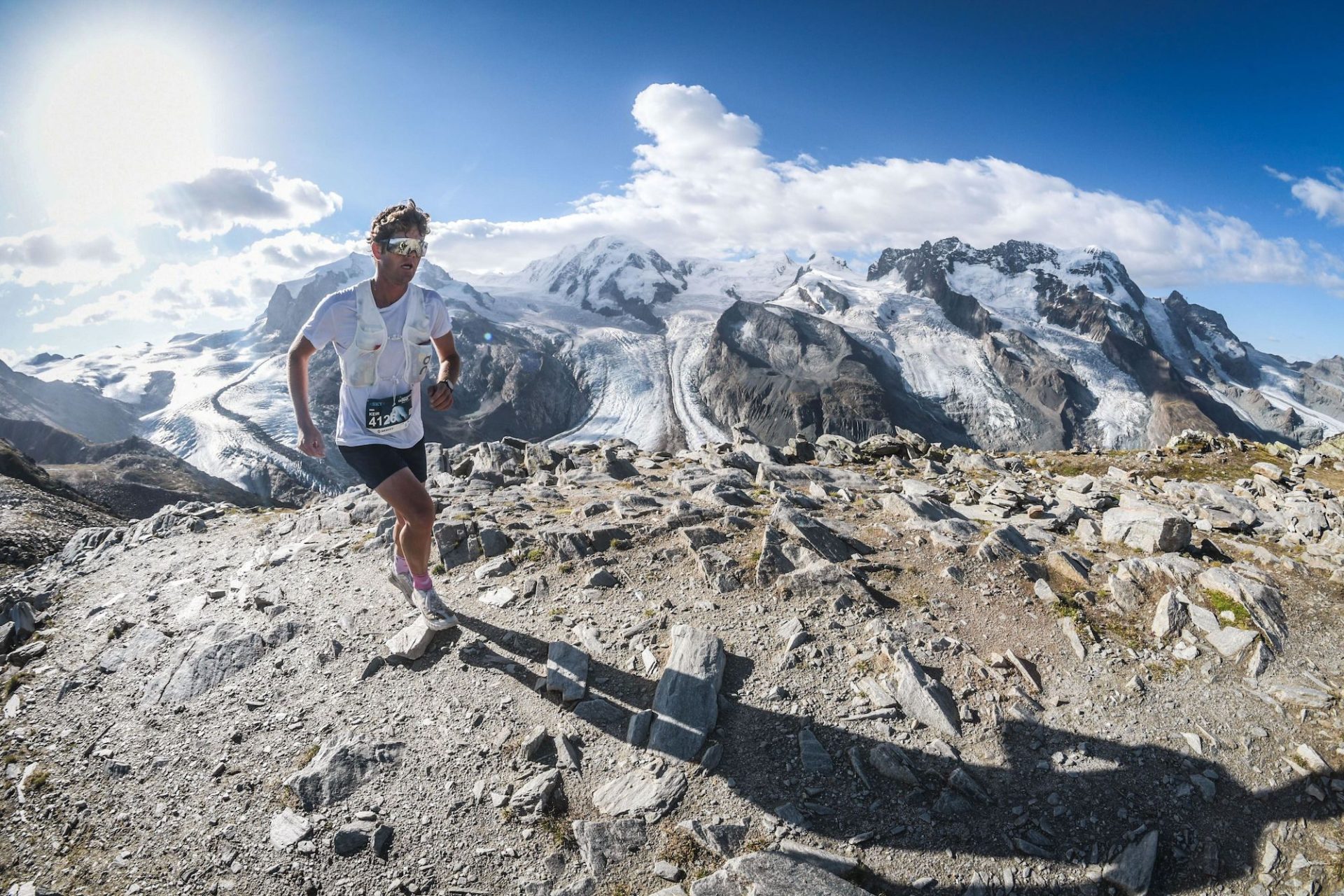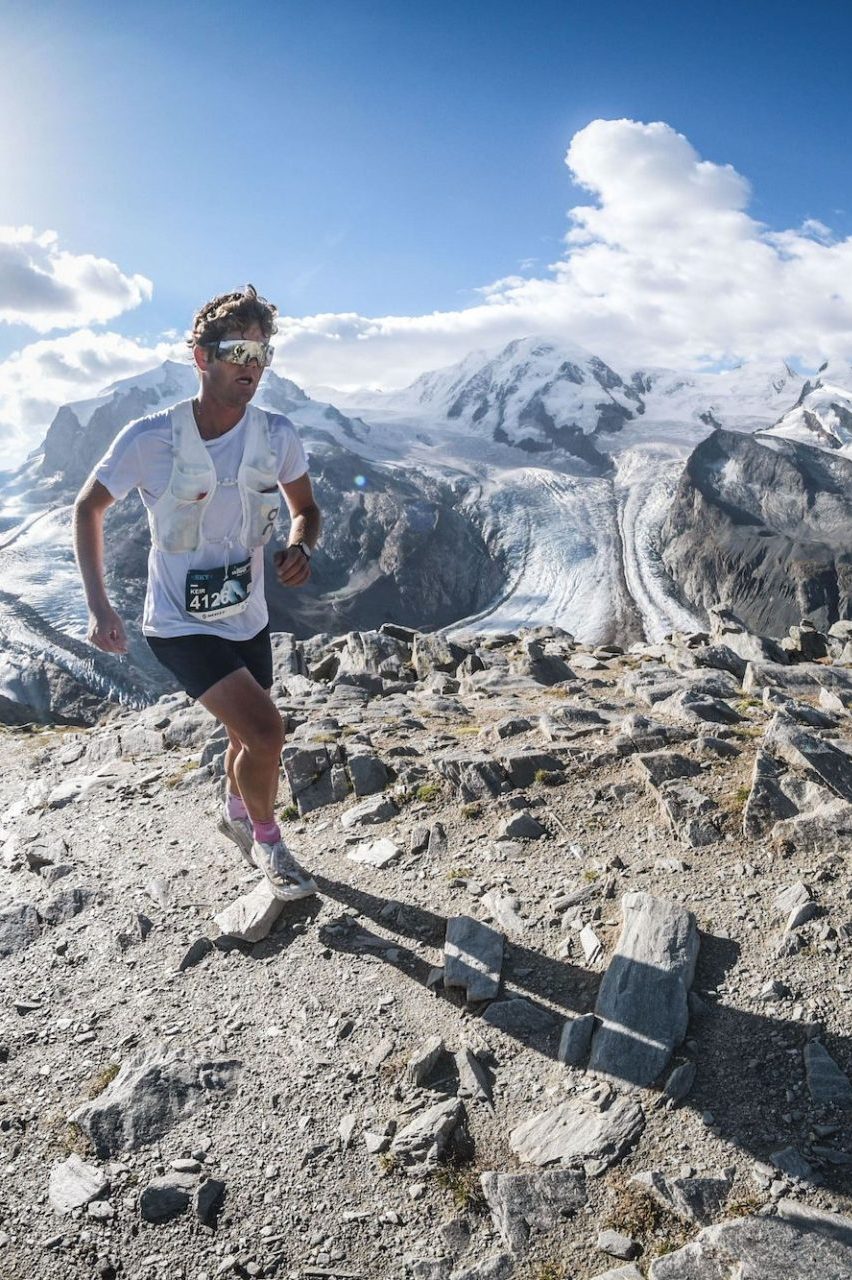Keir Plaice, a former elite racer, is now press officer for EF Education-EasyPost.
I just wanted to feel like an athlete. After four weeks of racing around the Tour de France, working with the world’s press, helping our Netflix crew, and writing a story a day from cars, feed zones, and hotel bars, while filming for RaceTV, I’d spent four very decadent days in Paris, keeping the fight-or-flight high going on fumes of adrenaline, cortisol, carafes of wine, and caffeine.
And then I crashed. I got home and slept like I hadn’t slept in months. I’d wake up and stare at my computer, write one word, and waver from my line of thought. I would flip open a tab and forget about it a second later, until I started looking up running races in the Alps.
There was this one I’d seen on Instagram – the Matterhorn Ultraks. It’s 50 kilometers with 3,600 meters of climbing, going way up above 3,000 meters in elevation. I love Zermatt. You look up at that forbidding summit, up the wooded valley, up the glaciers, up the black snow-strewn rock of the Matterhorn’s Swiss face, and feel that rare sense of calm that mountaineers once called the sublime, no matter how many times you’ve seen it on tourist posters or Toblerones.
I first heard about the mountain from my Granddad. He used to read us mountaineering stories on our hiking trips to New Hampshire. After roaming the peaks of the White Mountains, we would gather around his picnic table at night and he would read us tales about the early Alpine ascents by the light of his lantern. But 50 kilometers … I decided to do a week of real training to see where I stood.
During the Tour, I’d run every day. No matter how late I was up behind my computer or drinking wine at the bar, the alarm went off at six a.m., I found a coffee, and went for a run.
There were runs through industrial parks and old towns, where teenagers were still walking home arm-in-arm, singing songs, and making out around the corners of stone walls. There were mornings when I ran up through alpine forests and grassy meadows full of jangling cows to the height where the mountains turn to rock and marmots and ibex live and then turned and bombed down. On the rest day in Praz-sur-Arly, I turned when I reached the summit and almost danced when I saw Mont Blanc. There were run clubs with my colleagues, where I probably got to know those guys better than all the hours we’ve worked together, the time I paced our directeur sportif round his second five-kilometer lap and remembered what it feels like to be a sportsman.
I didn’t count kilometers or look at my pace. I just wanted that time, moving, out in the world, so I set my alarm every morning for six, found coffee, and took those first steps out the door.
Sport has always been my way to stay on the straight-and-narrow – and one of the ways I fall off it if I don’t keep myself in check. It’s the one steady thing I seem to want in my life. An hour outside in the morning and I’m ready to deal with whatever the day might bring, especially when I’m on the road for work. I like the routine, the day-to-day commitment, the sense of progress and purpose, the fresh, sweet air in my lungs and sun on my skin. I like the simple animal absurdity of doing hard things outdoors – often more than is smart.
That’s how I got into bike racing in the first place. I had finished high school early and had most of a year ahead of me before I was supposed to go to university – bright, empty days with no coach to make me run the gauntlet if I went to a bush party on a Wednesday night.
Sprint to the 10-yard line and get decked by two teammates; get up, sprint to the 20-yard line and get decked by two teammates; get up, sprint to the 30-yard line and get decked by two teammates—all the way down the field. Believe me, you don’t want to do it the afternoon after you and buddy have drunk a two four.
Mum must have been scared. What would I get up to with all of that free time? My job at the local hockey rink only filled so many hours. Why didn’t I give cycling a go?
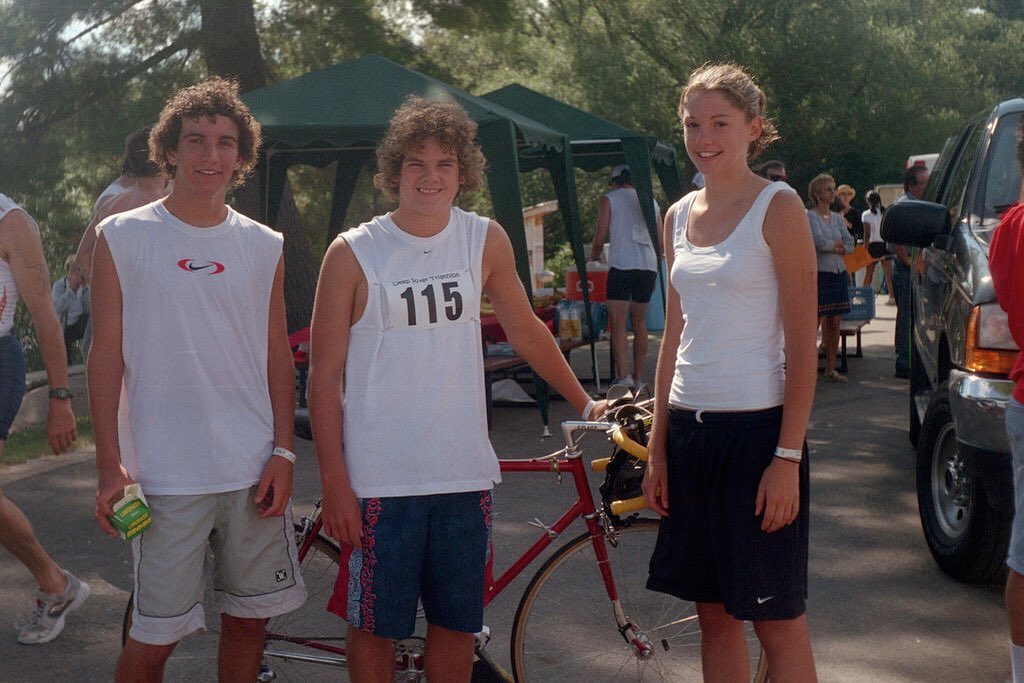
That summer, I’d done the bike leg of the local triathlon on a team with some friends. Dad had this old racing bike in the garage, which I rode around town a couple of times and then rocked up with in my board shorts and t-shirt and beat the out of towners in their Lycra with their fancy bikes. That felt good. So did the feeling of speed – cool wind on sweat, cold heat in your lungs, heart pummelling your ribs, as you pushed closer and closer to the darkening spot ahead.
Good idea, Mum.
I started riding every morning. I’d wake up at dawn, make coffee and enjoy a few moments of quiet, before heading out into the fog to race laps around town. I could do four in one hour if I went flat out. The ladies’ walking club would wave every time I passed. Otherwise, it was just me and the wind on our town’s tidy streets. I started to believe that if I kept doing what I was doing, day in and day out, I could obliterate the person I was, the person I was meant to become, and become someone new. I just had to ride fast enough.
Winter came. I got obsessed. I’d read in some magazine that pros ride 30 hours per week, so I bought a trainer, set it up in my parents’ sunroom, and rode it 30 hours per week. I’d read in some magazine that to win the Tour de France you had to have a threshold of 6.7 watts per kilogram, so I went hungry and lost weight. I started drinking vodka sodas at parties. Then, I stopped going to parties. I had to train. By the spring, I had turned myself from a running back into a climber. I now knew what a threshold was. My friends hardly knew me. I signed up to the nearest bicycle club and went and did a ramp test: six.
The good thing about racing is that it soon shatters your delusions. Racing puts you in your place. My first bike races were like running the gauntlet, but the ground was asphalt, not grass, and I was going 10 times faster than I ever could at football practice and I was not wearing any pads. I crashed and crashed and crashed. I’d sit there, bleeding, concussed, skin ripped from my arms and my hips and my back. No coach or teammate ever gave me a hand up. No whistle ever stopped the pack. But I kept going and won some races.
Telling Mum that I didn’t want to go to university was hard. I didn’t need some teacher to tell me what to read, and I never wanted to waste another minute staring out a window, being stuck indoors. Mum convinced me to do a semester, but I dropped out as soon as I got an invite to go ride for a Continental team. Never mind that I still didn’t know how to race.
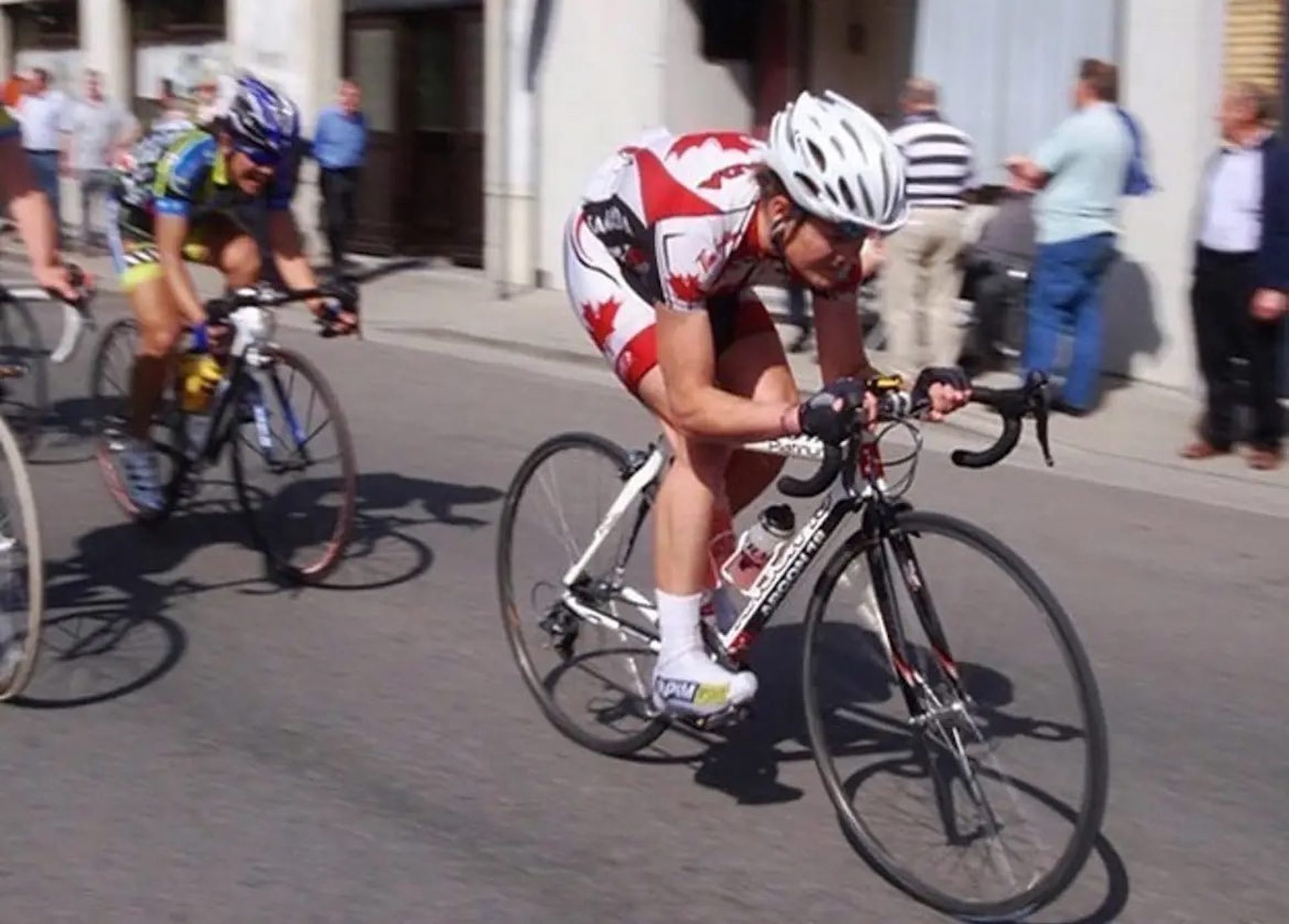
That took a couple of years. I finally went to Europe and learned the trade on the windswept cobbles and backroads of Belgium and the Netherlands. Racing three or four times a week from February to October tempered my bad habit of wrecking myself in training, but by the time I got any good, it was too late. I finally quit and went to university. All of the work I’d done, the risks I’d taken to make echelons and attack down descents, the skin I’d lost, bones I’d broken, races I’d won, friends I’d left behind, the pain I’d endured to try to ride fast for most of a decade felt worthless.
I have since tried hard to live a productive, studious, moderate life. The thing is no exam grade, no pay cheque, no magazine story or book published, no night out or in bed, compares to the feeling of flying towards that ever darkening spot before you and then crossing the finish line with your arms in the air, even at some podunk kermis. Everyday rewards are meaningless compared to the dizzying cocktail of fear and ego and exhilaration you find at the front of a race, exhausted, as you trade blows at speeds you refuse to think of.
So, I promised myself that I would never race again. I’d ride with friends. I’d ski or go hiking and do all of the outdoor stuff that I used to like to do before I got into racing, but never with a number on my back. I had to get my life together. I never wanted to kid myself again. Running was a nice, time-efficient way to keep in decent shape.
But now, for the first time in as long as I could remember, I let myself want to try to do something really hard.
The Sunday after the Tour, I went out with a dear friend and ran 30 kilometers. She’s a real runner, the kind of runner I will never be, with an elegant stride honed racing marathons for her university team. Whenever I ask her about my form, she laughs and says it’s clear I came from a different sport.
We got talking about life, like we always do. Running is even better than cycling for that. I told her that I’d got interested in these mountain races. I’d done one marathon before, but soon got bored. Looking down at your watch to check your pace is no more fun than looking down at a power meter. It might be worth it if it means you can run at the front of a race, but I was never going to be very good at running on the road. I’ve got stocky cycling legs. Running in the mountains is different, especially on harder terrain, where your pace is set by the trail and your thoughts can never drift far from your next footstep.
She said I should go for it; it might do me good to do something just for myself. I’m not sure about good. I will always be ashamed of how selfish I was when I was trying to be an athlete. The thing I wanted to do back then was so hard that I didn’t have time for the people I cared about. I gave everything to cycling, and wasn’t good enough. I had a few weeks at home alone now though. Fuck it, I thought. I was going to let myself relapse this once.
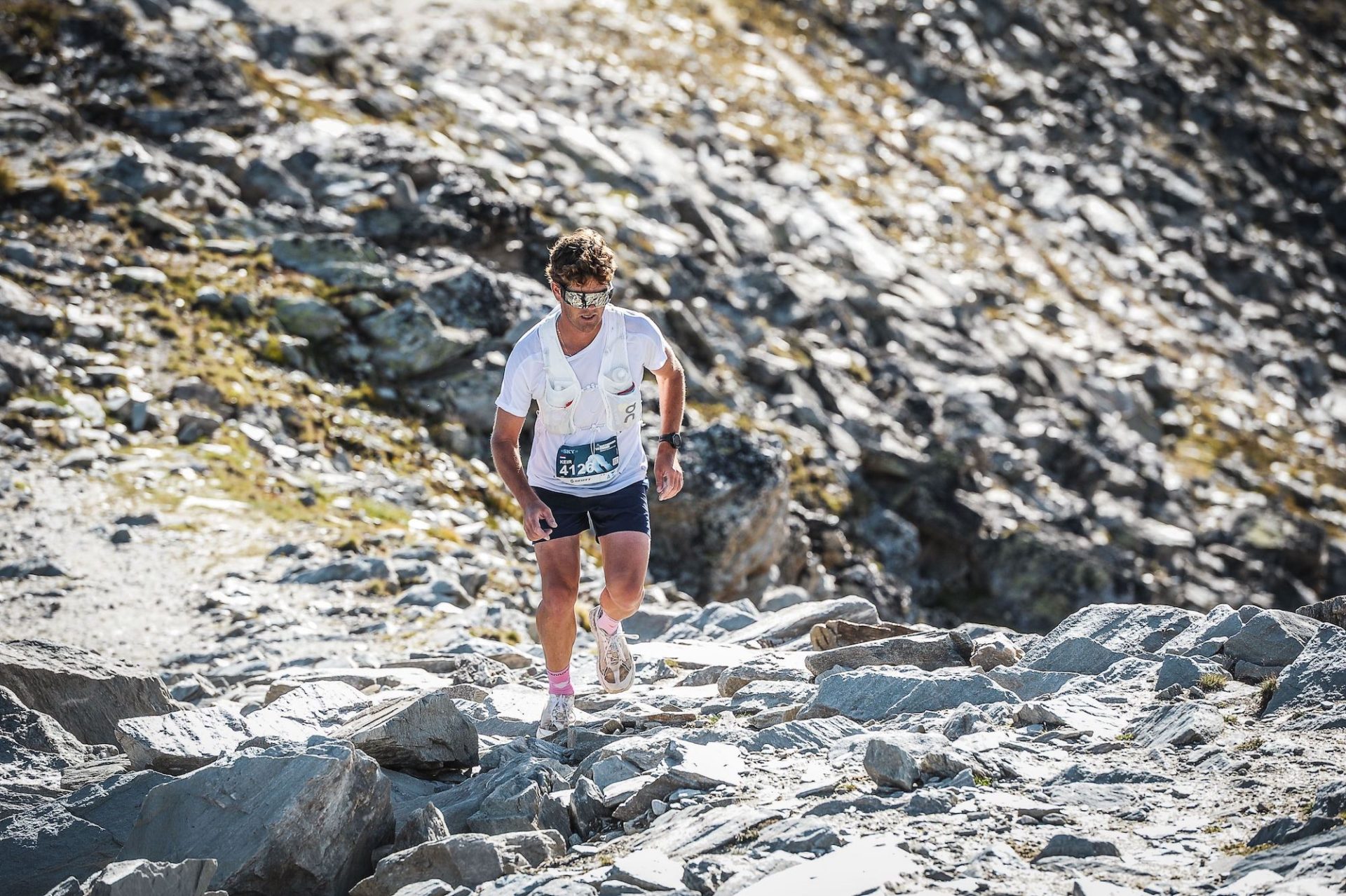
I went on a one-week training bender. On Tuesday I did a half-marathon. Then, I did a fast one. Then, I took a rest day, because I’m no longer such an idiot. I finished the week off with two half marathons in a row and then a marathon on Sunday. I hadn’t fallen apart. In fact, I still felt good. I’d convinced myself I could handle the Ultraks. I went on the internet that night and looked up the dates. Oh. It was in two weeks. A picture of the Matterhorn shimmered on my computer. Whatever. I had no idea where I would be next year. I signed up.
For the next two weeks, I lived like an athlete – a real one. I ate well, slept well, didn’t go partying, did a few easy bike rides. My head started to clear. I felt better than I had in years, now I had a sporting goal again to give shape to my days. I’d go for a jog and want to go fast, but save my legs.
Working for a WorldTour team now, I can only laugh at how stupid I was when I was trying to be a bike racer. I wasn’t healthy. Most of the riders I knew back then weren’t. The whole culture of the sport was pretty messed up. We just thought that riding harder and eating less was always the answer. That does work up to a point – you get your first high – but it can soon become destructive. You go chasing form and only make yourself weaker. The darker and darker spot keeps receding.
Of course, there were coaches out there who knew better, who were saying how important it was to fuel well and rest well and take care of yourself, but most racers, at least the ones I knew, were too headstrong to listen. I sure was. Watching the riders now is heartening. They have had modern science at their fingertips since they were cadets and have worked with good coaches from the time they started racing.
If they ever begin to drift off track, they can see it right away in their data. They have nutritionists and doctors and psychologists and sport scientists to help them keep fit and healthy and strong. If they all seem very straight-edge to me, that is all to the good. They race up mountains at speeds I just cannot fathom. I guess there was a part of me that still wanted to see how fast I could go if I did things right, if I acted like an athlete.
The starter’s shot echoed up and down the valley. The whole way up the Gornergrat, I kept an eye on my heart rate. If it went near 175, I’d slow to a hike. Go into the red at that altitude and I’d soon be gasping for breath and might not recover. I ate my 120 grams of carbs per hour and drank water from the bladders I’d tucked into my ultra-vest, as the rice I’d had for breakfast settled in my stomach. I’d tapered well, slept lots in the days leading up to the race, driven down to Switzerland with a day to spare and spent most of it in the hotel with my legs up, instead of exploring.
When a few pros broke away on the first ramp out of Zermatt, I resisted the urge to chase and just settled into my rhythm, taking the switchbacks one by one, as the village twinkled into the early-morning dusk and blue-grey clouds swirled round the white summit above me. Dirt road soon turned into a steep, rooted trail. My thighs burned. I understood then why all of the other runners had poles. Still, it was fun to move fast through the mountains.
Above the treeline, huge swells of rock and ice soared into the bluest sky, crests brushed by wisps of cloud. The sun warmed my neck, and I let myself be carried by the cold, clean breeze up boulder fields and steep pitches of scree. I passed runners and let runners pass me, until I got to the upper ridge, where the Nordend, Dufourspitze, Liskamm, Castor, Pollux, and Breithorn reigned over a massive flow of cracked grey ice. I dodged from rock to rock to rock along the crête. And then I heard someone shout that I was 19th.
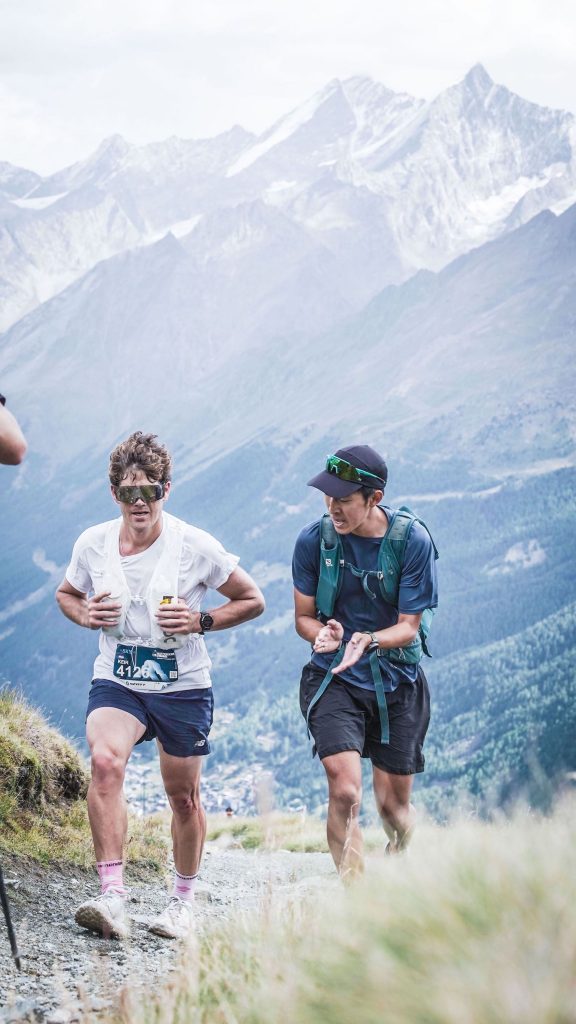
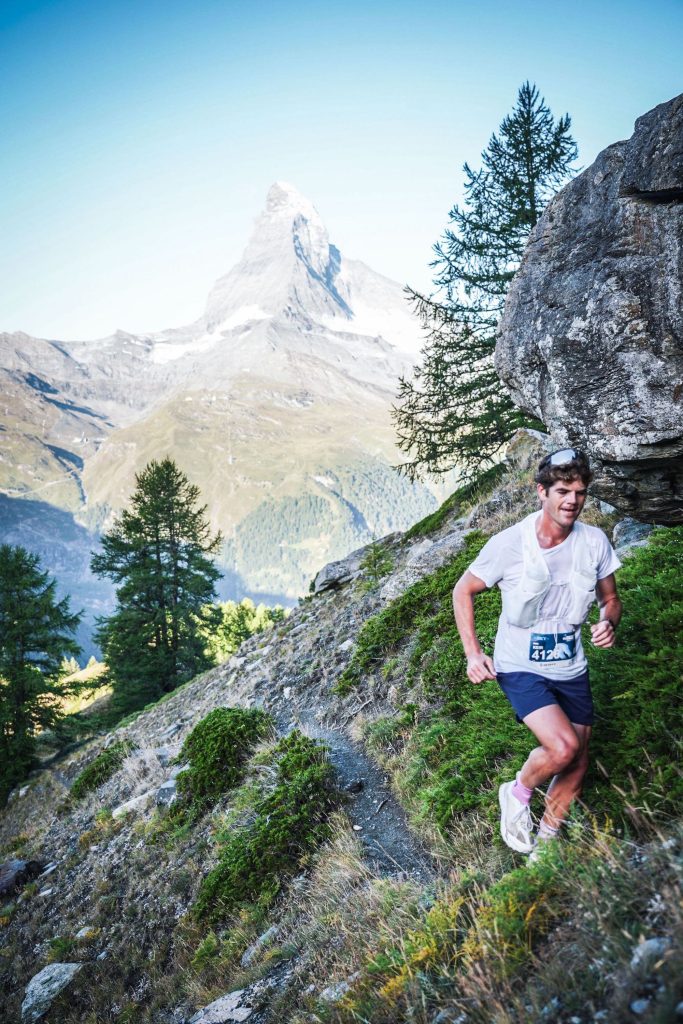
My dreaminess went.
For the first time since I had quit racing, I let pure ambition course into my veins.
Runners below me were making their way towards a tarn. The black spire of the Matterhorn rippled over the silver pond.
My feet found the rocks so fast that I didn’t have time to think about my fear. It was Granddad who taught me to run down mountains. He’d learned back in England, roaming the fells of the Lake District with his brother. Once you get up to speed, you’re not even running. It is more of a wild gallop from stone to stone to stone. The only thing closer to pure joy that I know is steep powder skiing, or maybe a fast descent on a bike. The trail was wet; some of the steeper pitches were very slippery, but I bombed down the Gornergrat as if I were 10, just daring the runners I caught to send it faster and faster down the next jumble of stones.
It was a race. I was holding my own.
Down in the valley, I gulped water at the aid station and took off up the trail, no longer looking at my watch, no longer looking at anything, just striding faster and faster, until breath and pain were concepts I couldn’t feel. For the next couple of hours, the dark spot was right there in front of me, and I ran towards it as fast as I could, crossing that climb and the next one in a hot oxygen-deprived haze. Somewhere, in the back of my mind, I knew that if I kept up the pace, I was going to crack, but I wanted to see how far I could go. I wanted to tempt fate.
I had visited the mountaineers’ cemetery in Zermatt the day before, and seen the graves of Michel-Auguste Croz, Robert Hadow, and Charles Hudson. Wandering there amongst the stones, I had remembered Edward Whymper’s words, which he wrote after his disastrous first ascent of the Matterhorn:
“Climb if you will, but remember that courage and strength are nought without prudence, and that a momentary negligence may destroy the happiness of a lifetime. Do nothing in haste; look well to each step; and from the beginning think what may be the end.”
It was a noble sentiment. I could still picture the engraving in the book, the rope breaking. But Whymper’s companions were now surrounded by dozens of other climbers who had died in years since in the Alps near Zermatt. If we’re lucky, we find ways to temper our desire for the infinite before it ruins us.
My race ended near the top of the climb to the Schwarzsee, after 31 kilometers and 2,400 metres of climbing. All the delusions I’d had of running to a heroic finish were shattered, as the strength left my legs, and I gave in to exhaustion. I slowed to a dizzying hike, each step more painful than the last, as runner after runner passed me. Flashes of alpine meadow came into focus.
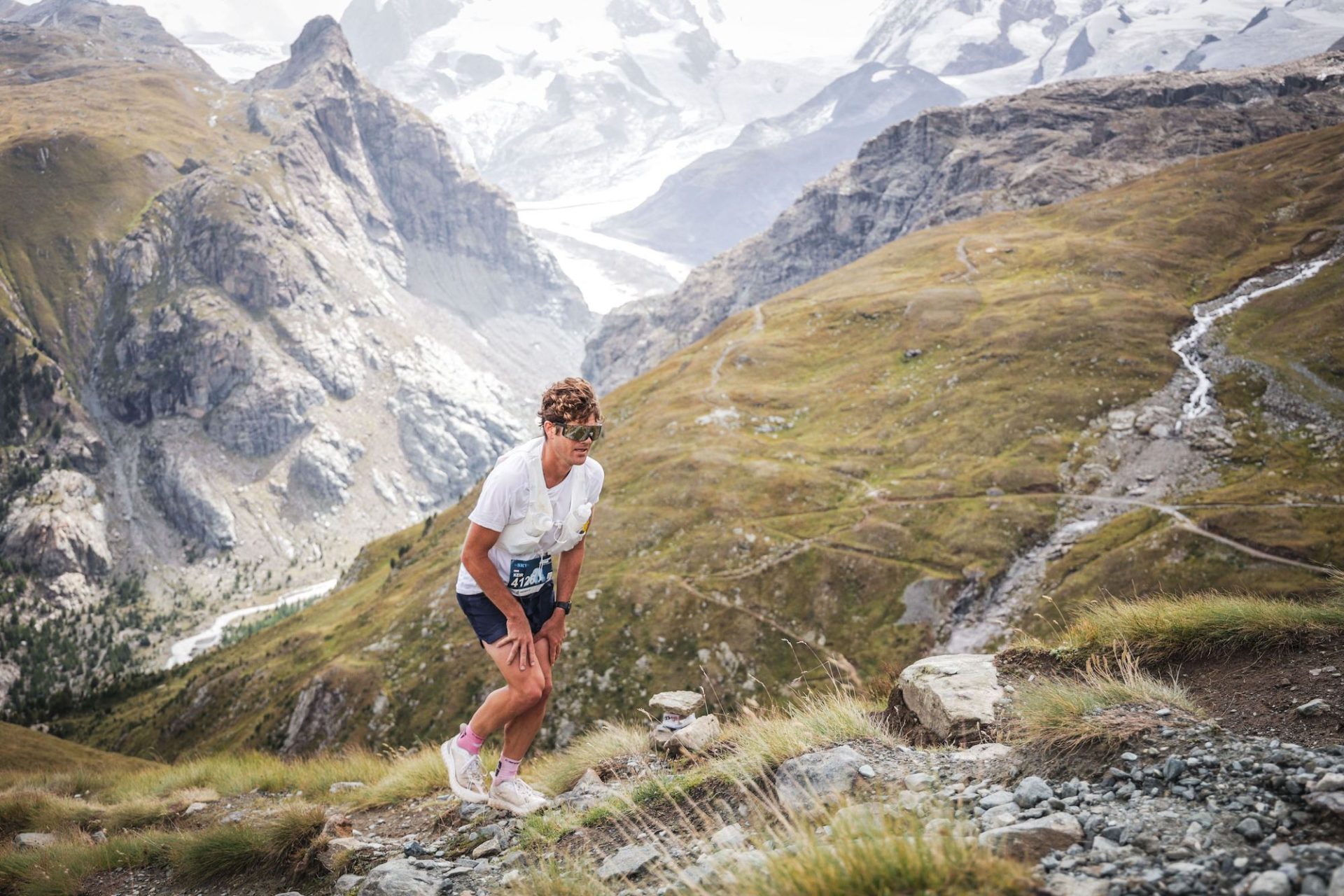
And then, I looked up and could only laugh at my absurd, self-absorbed effort. We were way up there, almost 20 kilometers from the finish. Dozens of people had hiked to the col to hand out chocolate and drinks, ring cowbells, and encourage runners. Old men passed me. Women passed me. Teenagers passed me. I was just another runner, not a racer. Runners came by and patted me on the back, asked if I needed help, and offered me food. All I could do was thank every one of them and keep hiking.
Shadows floated over the meadows. The black crag loomed.
A line that had been written on one of the mountaineer’s graves came back to me. I forget the name, but it said that he “passed into fuller life on the Matterhorn.“
I looked across the valley. A roiling black mass rolled over the distant peaks, lit up by electric booms.
We often say that our sports make us feel more alive. They put us at the center of our own stories and give consequence to our actions, but, let’s be real, their demands often mean that we shut out much of what makes life full and good. Sport had given everything I did purpose and direction, driven by my singular ambition. The commissaire’s flag would drop and nothing else would matter. I’d wait for a moment, and go chase the black spot, race into the void.
The storm blew in when I was up on the final ridge, a swirl of rain and hail that blasted up the valley and pelted my bare arms, face, and legs. I put on my raincoat and toque and hid behind a boulder, hugging its purple-green lichen for warmth. A few other runners were up there with me in the storm. We marched on together, hardly saying a word, taking turns pushing into the wind, sharing chocolate, and whatever drink we had left. The final descent was hard. The trail was off camber, slick, and my ankles were shot. Dozens of runners passed me, told me to go on, and then left me to stumble towards Zermatt.
I was just grateful to make it to the end.
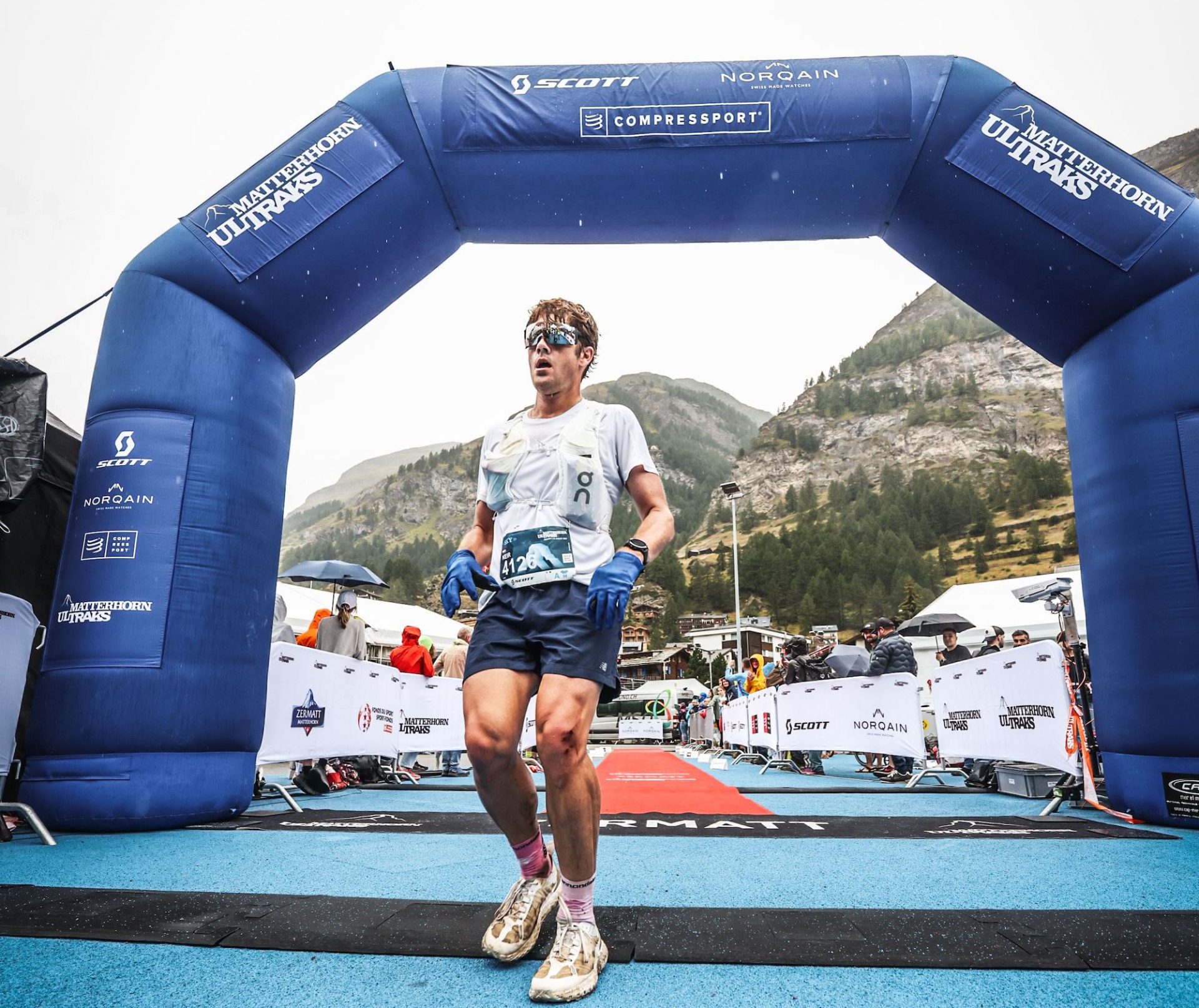
Down in the village, I crossed the finish line exhausted, sopping wet, and cold. A volunteer wrapped me in a blanket and helped get me into some dry clothes. After a few minutes I opened my phone.
“How did it go?”
“What happened?”
“You were doing so well!”
Messages pinged in from my running friends, from guys on the team, from Granddad.
And a big part of me still wanted to say, “Dammit! If only I had trained properly. If I’d paced myself. I could get good at this. I can beat those guys.”
But in my heart of hearts, I don’t want to be an athlete anymore, not a real one, not with that singular drive to excel.
I like chasing that black spot too much and the thought that I would want to give up this life that I love to do that again scares the hell out of me.
So, I rhymed off my finish time, and went and joined the hundred and whatever cheerful runners who had beat me for spaghetti and beer in the finishers’ tent.
It was time to fill the void.
What did you think of this story?
